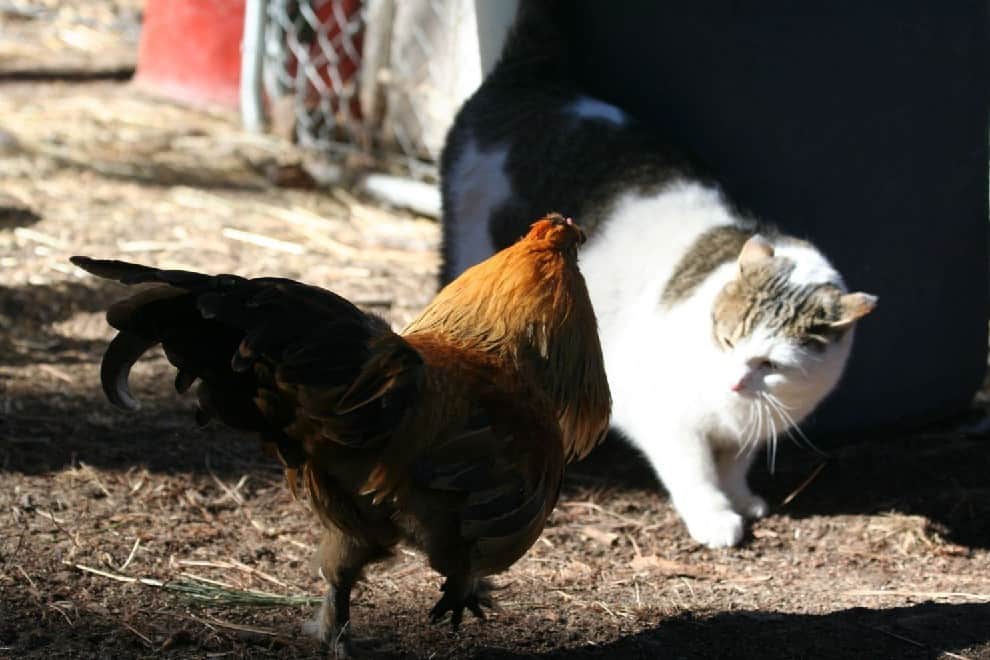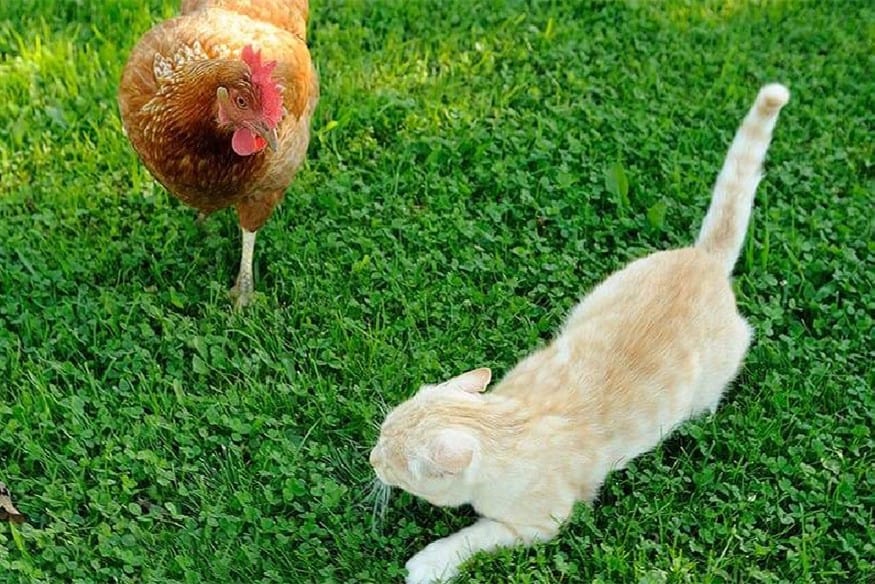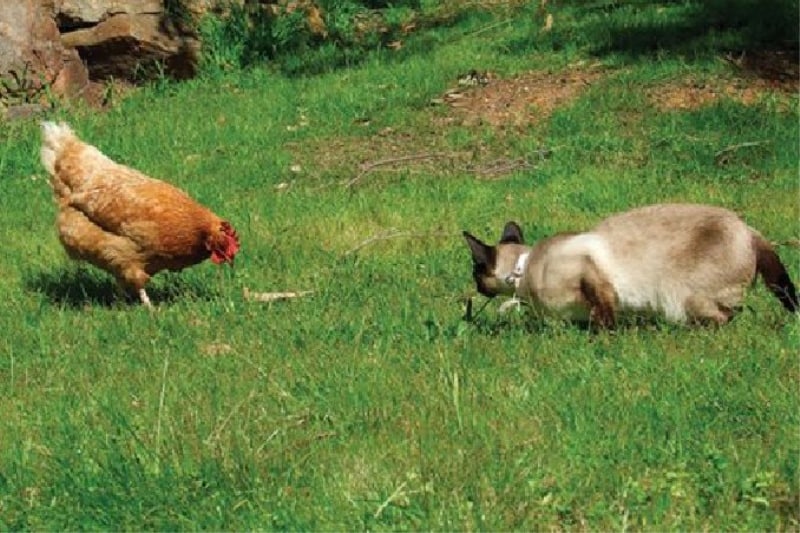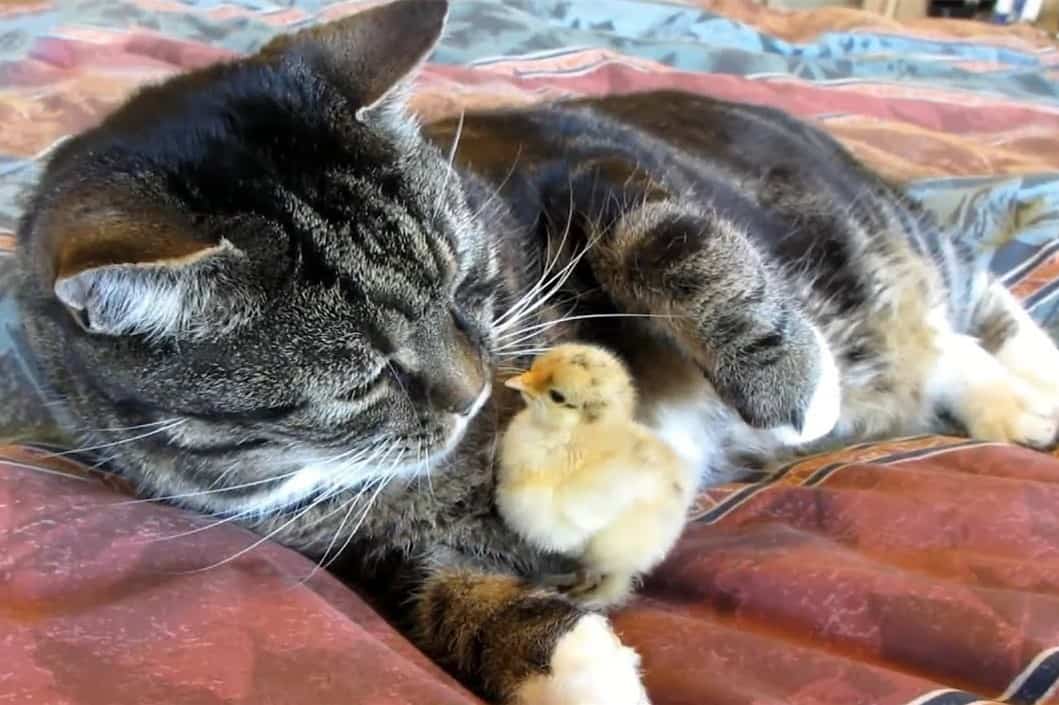As you decide to keep chickens, factors like your other pets should be considered. Owners can be a bit curious whether their existing pets can pose a danger to their flock. Cat people can ask questions like, Do cats eat chickens? Or Are my chickens safe around cats? These questions are naturally occurring, and knowing the answer to them is essential.
Cats and Chickens: Friends or Enemies?
You may have seen some backyard friendships on television and somewhere on social media. Well, it’s not so much of an impossible thing to do. In fact, cats and chickens can be kept in a similar space. These animals may not seem to be good housemates, but you best believe they can be!
In some cases, they immediately become friends, and in some, they need more time to adjust. All in all, it’s also about how an owner introduces them to one another. Their first encounters can be very awkward as they get to know each other. There are factors to note when it’s your first time bringing home a chicken or a cat. If you own a cat, it’s essential to look at the chicken you got home.
- Size – One thing to look at is the size of both the chicken and the cat. Cats do not see giant chickens as prey, especially because chickens are almost nearly their size and sometimes even bigger! However, they can be a little bit different on chicks. This is why introducing these two animals together is crucial in allowing and training them to live in a shared space.
- Aggressiveness – Cats can have different personalities. Some cats can exhibit inappropriate actions that can harm the chickens. It’s essential to watch your cats and discipline them. In the same manner, chickens can also be intimidating and can provoke the feline into using force. And so, a fight can break out in their space.
Introducing Chickens and Cats

So, how can people introduce and train these animals to coexist peacefully? The first time you bring a chicken home, it would, of course, be new to both the animals. And so, they can encounter a few problems as they start their relationship. However, this should not dishearten you to keep on encouraging their friendship.
While it’s unnecessary to introduce them as cats usually stay indoors, it would be helpful to know that they get along well with each other. On the other hand, when you have an outdoor cat as a pet, it’s best to have a proper meet and greet.
It would be helpful to introduce them slowly rather than letting them interact abruptly, face to face. Sudden and abrupt interactions or meetings can make them panic, and they may hurt each other in the process.
Meeting Step By Step

Step 1. One fence Apart
As preparation, it’s best to observe how they react upon seeing each other with a fence that separates them. The fence allows them to meet each other while at the same time having something that separates them in case something goes down.
With the fence present, they can scan each other’s smells, looks, and mannerisms. This is a good introduction step. The border keeps them safe in case they exhibit aggressive behavior. They are still adjusting to each other phase and thus act out of self-defense or establish dominance. When they do, they may tend to attack each other.
Step 2. Face to Face
Finally, the stage where they can meet each other without the fence. However, assistance is still crucial. There must be someone who will hold the chicken and someone who keeps an eye on the cat. This way, they have a closer interaction with each other.
It’s essential to have at least two people supervising and guiding the animals. If something does not go right, and they start getting aggressive, and you feel like they will attack anytime soon, you have enough time to get them away from each other. Hopefully, they may have already gotten used to the scent and presence of each other following the previous step.
Step 3. Free-roaming time
At this stage, after observing their face-to-face interaction, you can estimate how they have adjusted to each other. If you feel like your cat and chickens can already handle being together, you can place them in a space where they can move and interact more freely.
This means having no person hold another party or so. This way, they can adjust more and become comfortable with having each other inside the same space. Once you see how they interact, you can weigh how much they have adjusted with each other. Soon enough, you will be able to leave them together without supervision.
Cats as Predators

Typical house pets like cats probably won’t attack your chickens. But still, cats can be threats to your chicken. This occurs especially when the cats in question are not your pets and most probably feral.
These types of cats are usually dangerous for your chickens. Cats are pretty much the same size as most chickens. So, as long as they have enough food to fill their stomachs, they won’t risk a fight between the claws and beaks of chickens against their claws and teeth.
Cats usually go for chickens when they have no choice and no other source of food to eat. This is why chicken owners should be more careful of hungry cats that may take a liking to their flocks.
When you spot a suspicious cat that may be stalking your chickens, it’s best to take the necessary actions to avoid getting your chickens hurt. Provide ample protection for your chickens.
Chicks are usually in danger when cats are around. They are the perfect snack, and their size allows cats to get their fangs on them and gobble them. This is why you need to provide extra care and protection for chicks. When cats attack, they usually hurt more than just one chick. This can be quite a disaster for flock owners who are breeding chickens.
Protecting Your Chicks
It’s pretty easy to keep chicks safe. One of the best ways is to keep them secured in a well-constructed brooder. While brooders are typically secured, it’s vital to ensure that the chicks are safe from cats trying to reach out through holes or anything that grants entrance. It’s important to note that hungry predators will do almost anything to be able to feed themselves.
With this information, it’s best to use foolproof materials like a proper screen with small holes. It’s best to make sure that the holes do not allow entry of cat paws. Use a screen that is made of fine mesh hardware cloth.
Cats can also turn the brooder over, primarily when it’s not supported well. You can have a lid and top it with something heavy. However, even this can be overcome by cats when extremely curious and in need of a snack.
To ensure good security, you can install a proper lock. Overall, it’s essential to place the brooder somewhere cats can’t have access to. You can have a separate room for them and keep openings as windows closed. Prevention is indeed better than cure.
For bigger chickens, those that have matured and are at the right age, cats aren’t usually a threat. In fact, they can grow fond of each other. They can be friends in no time!

Predators to Watch Out For
Apparently, cats are not the only predators that chickens need to watch out for. There are a lot, especially when you live somewhere, that is home to many wild animals.
- Dogs – Although these are usually humans’ friendly and fluffy friends, they can be dangerous to chickens. One, they typically kill for sport. This means they kill even when they are not hungry, void of the predatory purpose. They can maim your chickens and leave them dead. Most dogs who kill for sport do not just kill one chicken. Instead, they kill more than one, and most of the time, many chickens are lost. They do not just kill for sport every time too. They also sometimes go for chickens as meals, leaving just the feet and pulling feathers
- Raccoons – Raccoons are pretty tricky creatures because they are nocturnal. This means humans do not always have the time to keep watch on them. These mammals hunt individually or by their family group. They are active at night and will probably kill more than one chicken. These creatures are primarily interested in the chicken’s insides. You will find a clue once the sun rises as you may find the carcass of your dead flock.
There are more predators that you should keep your chickens safe from. It’s always safest to install fences and do the necessary acts of protection to keep them away.
Summary
Do cats eat chickens? The answer is yes. Cats are predatory and will probably have the guts and appetite to eat chickens. However, these are when times call them to. In short, when they are provoked and starving. Other than these reasons, cats can get along with chickens, although they may fight at times.


Joseph Hudson has been raising chickens for over 15 years. In 2018, he completed the Agriculture & Natural Resources program at Mt. San Antonio College. He currently raises over 1400 chickens on his 7.5-hectare farm. He keeps sharing his experience on raising healthy and happy chickens on Chicken Scratch The Foundry.







